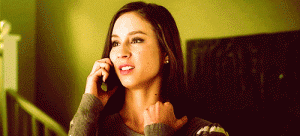If an interview is like a first date, a phone interview is like a “drink thing.” Things could go really well, leaving you plenty of room to turn a drink into dinner, but things can also go really poorly and you’ve got a ready-made excuse to leave for your dinner plans.
This is not the reaction you’re looking for.
The most important thing about a phone interview is that it requires just as much prep work as an in-person interview and just as much follow up as an in-person interview. It’s not an excuse to forego your research or skip a thank you note.
But, logistically, it’s a lot different than an in-person interview. If you want to make it to the in-person interview, you better believe it’s important to wow the recruiter over the phone. And because 55% of the effectiveness of your communication is based on non-verbal cues, you’ve got to nail the other 45%.
So how do you impress the person on the other end of the phone?
BEFORE YOU PICK UP THE PHONE
SET UP IN THE RIGHT SPACE.
You want to find a place that is private, quiet and where you have good cell phone service. It doesn’t have to be library quiet, but keep in mind that the phone is going to pick up ambient noise. If you’re at a coffee shop or an airport, the interviewer is going to hear coffee orders or flight delays in the background.
Finding the right place is especially difficult if you’re currently employed. Plan around this and be upfront about scheduling limitations with your interviewer. If you need to schedule before you leave for work in the morning, or after your boss leaves in the evening, talk to us.
DRESS UP AND SIT UP STRAIGHT, EVEN THOUGH NO ONE IS GOING TO SEE YOU.
Both your clothing and your posture can have an impact on your perception of yourself – dressing well and practicing so-called power poses can improve your performance in an interview, regardless of actual preparation.
WHEN YOU ANSWER THE PHONE
ANSWER THE PHONE ON TIME.
Just because this is over the phone does not mean you shouldn’t treat it like any other interview or appointment. Ensure that you are in your designated space at least five minutes before the call, and you’re ready to pick up the phone when it rings.
ANSWER IN A PROFESSIONAL WAY.
When we learn to answer a phone, most of us learn it as a question. You’re asking the caller on the other line who is calling. But when you’re expecting a phone call, it shouldn’t be a question. Consider the differences between these two opening remarks:
“Hello?”
“Hello, this is _______.”
One says “Why is my phone ringing? I wasn’t expecting a call,” and the other says, “I am professional and confident.”
What that translates to for an interviewer: “I’m not prepared,” or “I could talk to a client.”
WHEN YOU’RE ON THE PHONE.
SHOW YOU’RE ACTIVELY LISTENING.
Many of the cues we are taught to show active listening are non-verbal (looking directly at the speaker, nodding, smiling and even our posture), so it’s important you give a verbal indication that you are listening. A mumbled “okay” or “uh huh” every so often cues the interviewer that you are following along.
Asking follow up questions, either now or at the end of the interview is also key. And be clear you’re referencing an earlier remark. Starting a questions with “Earlier you mentioned…,” makes it clear that you were listening.
GET THE TIMING DOWN.
Non-verbal cues also help us understand when someone is finished with their thought or when they are going to say something else. It can be tricky on the phone to know when the interviewer is done asking a question and you should start answering. When in doubt, pause for a second or two before answering, because an awkward silence is better than interrupting.
If you both start to say something at the same time, wait for the interviewer to either proceed with what they are saying, or tell you to go ahead with what you were saying.



